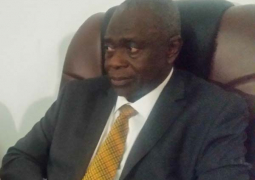Stakeholders from Technical Advisory Committees (TAC), local authorities and other natural resource users in various provincial regions were recently sensitised on the framework of the National Biodiversity Strategy and Action Plan (NBSAP).
The Kanifing Municipal Council was the latest to benefit from the sensitization and recently concluded a twelve-day sensitization meeting held at Kanifing Municipal Council chambers.
The project is being implemented under the auspices of the Department of Parks and Wildlife Management (DPWM) and its sensitization meetings have been held in all the regions participating.
According to officials, the NBSAP was developed in 1998, which encompasses a comprehensive framework for effective conservation of the fast declining biodiversity heritage of the country.
Speaking at the meeting held at Kanifing Municipal Council chambers, Salimina Jobe, NBSAP project coordinator, stated that NBSAP review project is a GEF-funded small-scale project implemented by UNEP aimed at ensuring the effective mainstreaming of biodiversity conservation issue into sectoral policies of stakeholder institutions of member states including The Gambia. This, he noted, would essentially involve reviewing and updating the NBSAP report through a highly participatory and consultative process.
National Biodiversity Strategies and Action Plans (NBSAPs) are the principal instruments for implementing the convention at the national level that requires countries to prepare a national biodiversity strategy (or equivalent instrument) and to ensure that this strategy is mainstreamed into the planning and activities of all those sectors whose activities can have an impact on biodiversity.
“The National Biodiversity and Action Plan is therefore a culmination of the preludes in our efforts in meeting our international commitments to the full implementation of the convention,” Mr Jobe stated.
The Convention on Biological Diversity is a framework for national action for the conservation of biodiversity, the sustainable use of its components and the equitable sharing of benefits arising out of the utilization of genetic resources, he said, pointing out that the 2010 biodiversity target was not met in full; that there remains a need to enhance national capacity for the implementation.
For his part, the National Focal Point for Protected Areas, Kawsu Jammeh who doubles as the biodiversity specialist at Department of Parks and Wildlife Management, said the objectives of the forum was among others to ensure a thorough understanding of the full process of developing a national biodiversity action plan, initiate stocking, establish a steering committee as well as discuss and process a draft procurement plan.
The convention, he noted, requires countries to prepare a national biodiversity strategy or equivalent instrument and to ensure that this strategy is mainstreamed into the planning and activities of all those sectors whose activities can have positive and negative impacts on biodiversity.
The Gambia is a signatory to the party which was subsequently ratified in the late 90s, he said, adding that prior to and since these acts of national commitment, the Government of The Gambia has undertaken several initiatives that have contributed to the implementation of the convention such as the adaptation of the Gambia Environmental Action Plan 1990-1992, the enactment of the National Environment Forest Policy among others.
“The revised NBSAP is going to be designed as a website, accessible to all sectors,” he said, adding that such a national portal will allow every thematic issue area and sub-national entities including the municipalities to have their strategies.”
Speaking on behalf of the participants, Fatou Gibba, Community Development Officer at KMC, said the Government of The Gambia is committed to the conservation and restoration of natural habitats and their biodiversity, and provides direct benefits to local communities and around protected areas and assure the project officials of their full support at all level.



__FillWzI1NSwxODBd.jpg)